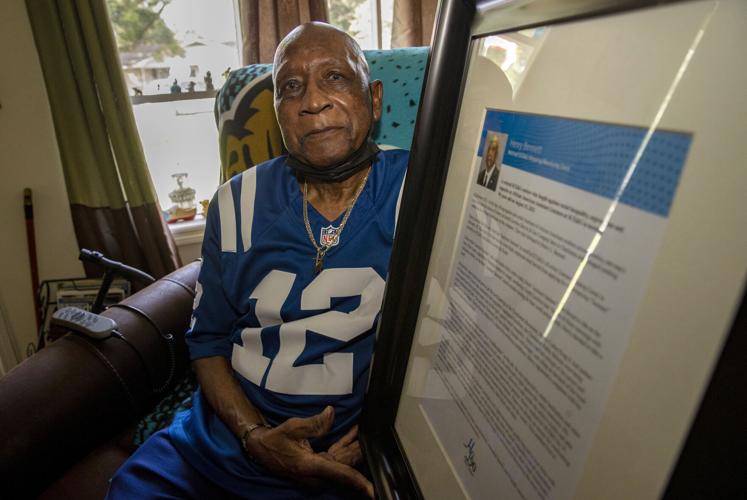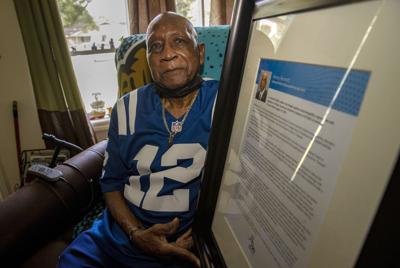Icons of the civil rights movement in South Carolina, like Septima Clark and Lucille Whipper, smashed social and legal barriers to help end segregation in the state, organized voter registration drives, protested exclusionary policies and established schools.
Among those titans of the movement were thousands of other African Americans who played their part, too, albeit in smaller roles.
That includes Henry Bennett, who celebrated his 90th birthday in August.
Bennett's alma mater is an elementary school.
That's because from the age of 10, he has always worked, first sweeping up at a clothing store before running errands for two drug stores. Bennett worked for a toy store, where he delivered items for assembling toys and baby cribs, and also worked at a department store.
He quit school as a child to support his mother and two sisters. The family lived together on Sumter Street in downtown Charleston. Bennett's parents divorced when he was young, leaving him to help care for the family.
Now a resident of the Ladson area, he grew up under segregation.
"I don't know how to explain it, but it was a struggle," he said.
In 1959, a few years after marrying his second wife, Juanita Chisolm, Bennett began working for S.C. Electric & Gas Co.
SCE&G traces its origins to the Charleston Gas Light Co. founded in 1846. Through a series of mergers, it became one of the dominant electric utilities in the 20th century. The year Bennett started at the company, SCE&G partnered with three other utilities to build the first electric-producing nuclear power plant in the Southeast, in Parr, Fairfield County.

Photographs of Henry Bennett are seen from his time as a lineman at South Carolina Electric & Gas. Andrew J. Whitaker/Staff
The company was no stranger to controversy. In 1954, Sarah Mae Flemming would sue the utility after she was expelled from a company-owned bus in Columbia for sitting in the "white-only" section. Flemming eventually lost the case at trial, but by then Rosa Parks had sparked the Montgomery bus boycott through a similar protest.
Bennett began working for SCE&G as a janitor, but after taking a three-year course to become a trained electrician, he was promoted to lineman assistant.
Bennett then enrolled at the Linemen Training Center in Denmark, one of the first African Americans to attend the school. Outside of the classroom, he was separated from his White peers, forced to eat and sleep at a boarding house while the White employees stayed in a hotel.
The father of four graduated and continued working as a lineman assistant, riding on a utility truck and fixing power lines in the region.
Segregation persisted at work sites, too. Black assistant linemen were forced to sit in the back of the utility trucks while the White linemen were in the cab. Bennett said they were exposed to the elements on the back of the truck, suffering through brutal heat, rain, sleet and cold.
On one particularly cold and rainy day in the mid-1960s, Bennett complained to his boss. He said he would rather go home than sit on the back of the truck.
Bennett was sent home for the day. He intended to file a formal complaint for discrimination with the central office in Columbia, but by the time he called, the bosses upstairs had already heard about him.
He was told to meet with his supervisor the next day.
"How you feel about the company now," his supervisor asked.
"I don't feel nowhere bad about the company," Bennett replied. "But how would you feel if your son was on that truck that morning, as cold as it was?"
Bennett said his supervisor did not respond, but he told Bennett whenever he wanted to get in the truck, he was was welcome to do so.
"From then on, it was smooth sailing," Bennett said.
It was a small act of defiance, but an important one for the company's black assistant linemen. No longer would they suffer the indignity of riding in the back of the trucks.
Bennett said he suffered retaliation from the company for raising his voice, however. He was passed over for promotions to become a full lineman, he said. Eventually, he asked to be transferred to the company's shipping and receiving department, where he worked as a clerk and served as a union steward.
He retired from SCE&G in 1994 after 35 years with the company.
Gail Fludd Washington, Bennett's niece, said she is proud of her uncle for helping to improve conditions at the company, even if it was not acknowledged at the time. She said there were a lot of people who helped chip away at segregation laws and practices, and she was happy her uncle got at least some recognition for the risk he took.
"He was one of the people who spoke out," Washington said. "And because he spoke out at SCE&G, that actually paved the way for how things are now. People are still talking about that."













